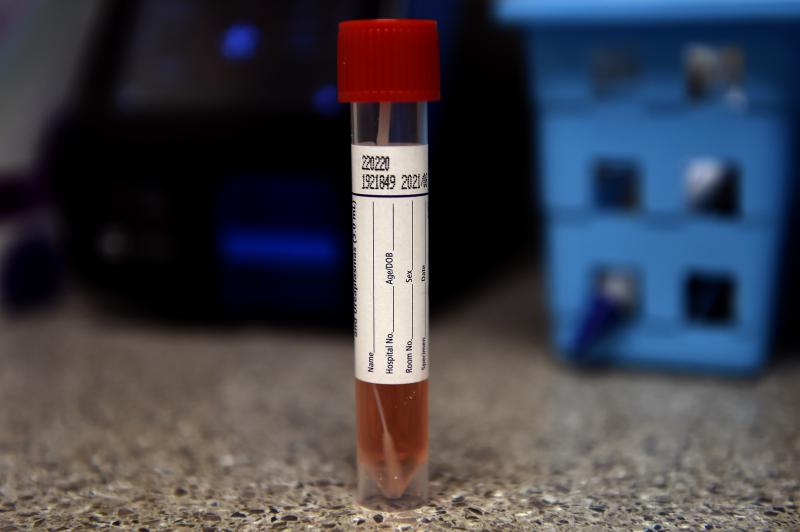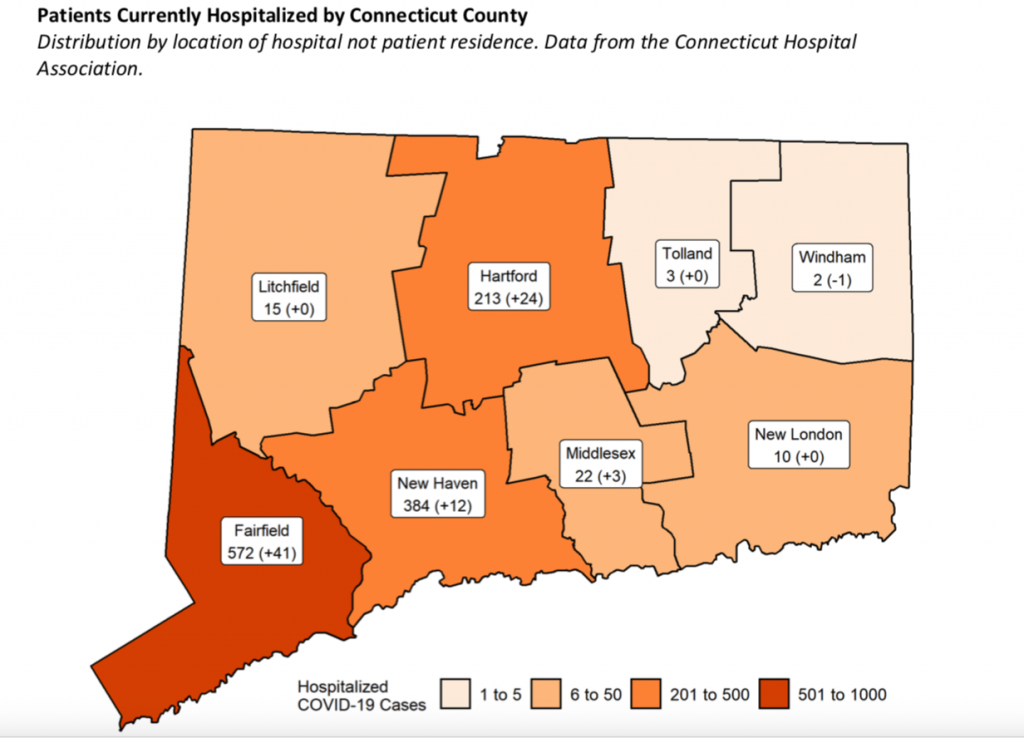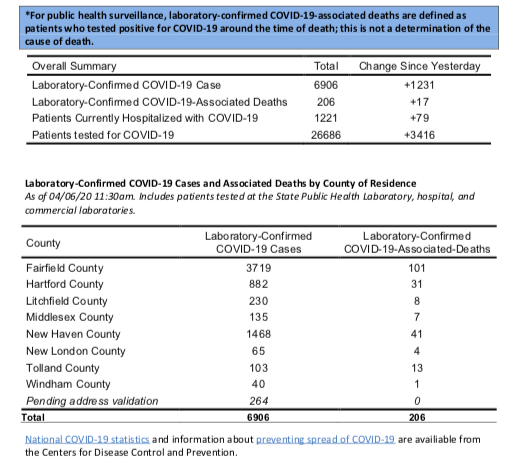State Numbers Grow, but Lamont Sees ‘Reasonable Good News’

Audio By Carbonatix

A COVID-19 test ready to be packaged at the Urgent Care Center of Connecticut in Bloomfield last month. Photo credit: Joe Amon, Connecticut Public Radio (courtesy of CTMirror.org)
West Hartford has seven more confirmed positive cases of COVID-19. In total there are 6,906 coronavirus cases in Connecticut, while 206 people have died and more than 1,200 people are hospitalized.
By Patrick Skahill, Connecticut Public Radio for CTMirror.org
Gov. Ned Lamont said Monday during his first virtual press briefing that an additional 1,231 people tested positive for COVID-19, but he again cautioned against reading too much into day-to-day positive case counts, saying they are tethered to daily variations in state testing capacity.
Monday’s total number of positives was based on 3,416 reported tests.
Instead, the governor expressed a degree of optimism about something counterintuitive: hospitalizations.
“Because the number of people hospitalized is not based upon just the number of people we’ve tested, but it’s based on everybody that’s infected out there,” Lamont said.
Lamont said day-by-day changes for hospitalization in Connecticut have remained relatively flat.
“I take this as [reasonably] good news,” Lamont said. “The situation could have been a lot more severe … this gives us a lot more room to breathe.”

More information about hospitalized cases of COVID-19 in New Haven and Middlesex Counties is available from COVID-NET.
Monday’s new data brings the total number of coronavirus cases in Connecticut to 6,906. A total of 206 people have died and more than 1,200 people are hospitalized.
In hard-hit Fairfield county, hospitalizations jumped by about 40 people Monday. New Haven saw an increase of 12 new patients hospitalized with COVID-19.

Lamont cautioned that, when hospitalizations eventually peak and begin to decline, the state may still have a long road of recovery ahead. And testing will be key to getting people back to work.
“It may not be the next day, it may be the next year,” Lamont said. “How can we thoughtfully get people back to work without having another wave of infections? A lot of that’s going to be in and around more broad-based testing.”
Connecticut looks to boost COVID-19 testing capacity
Sema4, a Stamford-based company, said Monday it will analyze thousands of coronavirus tests, joining a cohort that includes Jackson Labs of Farmington and other private labs.
The testing boost is likely to be needed as the virus continues its surge across Fairfield and New Haven counties. As of Sunday, those two regions accounted for roughly 80 percent of Connecticut’s coronavirus-related hospitalizations.
Gov. Ned Lamont has repeatedly said he wants to build out Connecticut’s COVID-19 testing capacity.
Over the last week, the state averaged a little under 1,500 COVID-19 tests each day.
Since late February, the state public-health laboratory in Rocky Hill performed around 2,700 tests.
On Monday, Sema4 said in a news release that it will analyze up to 6,000 COVID-19 tests per week at its Branford laboratory. It’s also promising a fast turnaround for results – one to two days. The state praised the news.
“With our proximity to the epicenter of the worst COVID-19 outbreak in the United States, we desperately need increased testing capacity and reliable results reported as quickly as possible,” said Josh Geballe, Lamont’s chief operating officer, in the news release.
Doctors in Connecticut and New York will be able to order the COVID-19 tests. Health care providers will take samples via nasal or oral swab and samples will then be sent to the Branford lab. Tests for the disease are free to patients regardless of their insurance status.
State Attorney General wants special enrollment for federal health insurance exchange
More than 20 state attorneys general across the country – including Connecticut Attorney General William Tong – wrote to national officials Friday asking for a special enrollment window on the federal insurance exchange.
Connecticut runs its own state marketplace, Access Health CT, which has declared a special enrollment period that runs until April 17. That means if you live in Connecticut and don’t have insurance, you can still enroll in a private health plan.
Most states in the U.S. don’t have their own health insurance exchanges. Instead, these 38 states rely on the federal exchange, healthcare.gov.
But the Trump administration told NPR on Friday that it has decided against a special enrollment window for the federal exchange, healthcare.gov.
In a Friday letter, the attorneys general called that decision “shortsighted.”
“Millions of individuals have lost their jobs – and with their jobs, their ability to pay for healthcare,” the letter reads. “We should not allow the virus to prevent sick people from obtaining treatment because they lack healthcare coverage or to face financial ruin if they seek care.”
In addition to Connecticut, other states like California have extended enrollment windows on their state-run insurance marketplaces. The attorneys general urged the federal government to do the same.
“While tests for the disease are free, treatment may not be,” the letter continues. “And medical bills for uninsured individuals can be in the tens of thousands of dollars. Therefore, the COVID-19 pandemic threatens to amplify our national problem of high medical bills.”
Reprinted with permission of The Connecticut Mirror.
West Hartford specific information was provided by Ronni Newton, we-ha.com.
Like what you see here? Click here to subscribe to We-Ha’s newsletter so you’ll always be in the know about what’s happening in West Hartford!




[…] In the first week of April 2020, Lamont announced at a press conference that a deal was reached with …per week. It was also declared in a SEMA4 press release with Geballe quoted in it. […]